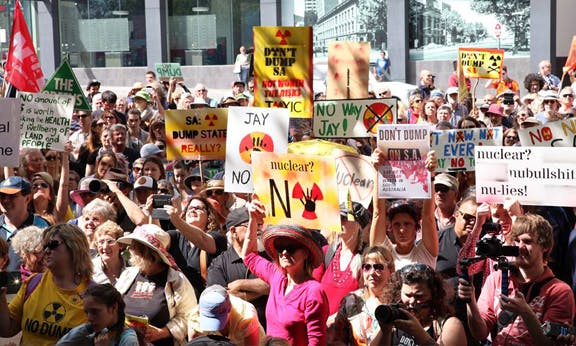Time to take up the fight over South Australian nuclear dump plans

The fifteenth of October was the 63rd anniversary of the first atomic weapons test at Emu Field, South Australia. Rather than remembering in silence, Adelaide was alive with energy as 3,000 people gathered at the steps of Parliament House to express anger at plans to make the state the world’s nuclear dumping ground.
With chants of “Nuclear waste, no way!”, the crowd rejected the state government’s proposal to create the world’s first international nuclear waste dump, as well as the federal government’s proposal to dump national waste in the Flinders Ranges.
Chairing the rally was Karina Lester, a Yankunytjatjara Anangu woman and daughter of Yami Lester, historic campaigner against nuclear crimes on Aboriginal land. Karina opened the protest, saying, “We have the experience. They tested in our backyard, and yet again they are proposing to put a nuclear waste dump in our backyard”.
South Australia has a long history of struggle against uranium mining, the development of nuclear energy and the dumping of nuclear waste. With initiative from trade unions, Aboriginal groups and left wing political organisations, mass protests have kept the radioactive aspirations of the powerful in check.
At high points, workers have taken direct action. In the wake of French nuclear tests in the early 1970s, unions such as the Waterside Workers Federation put black bans on the export of uranium.
The legacy of these past struggles can be found in current state legislation and ALP policy, both of which prohibit the kind of nuclear waste dumps being proposed. But existing legal protections can’t be taken for granted.
Without serious fights to keep nuclear waste out of South Australia, the likes of premier Jay Weatherill will claw back more space for the nuclear fuel cycle in the state. We can always expect uranium mining companies to push for an expansion of their operations.
The protest on 15 October was a great starting point. It drew attention to the sizeable public opposition to the nuclear industry, despite Weatherill’s claims of broad support for his opening of a “conversation”.
If our side is going to win, we need to keep mobilising thousands in protest for as long as nuclear waste is on the table. Most importantly, unions can wield their industrial strength. Projects of this scale require the cooperation of innumerable workers. If dock workers refuse to unload canisters of waste from ships, if transport workers refuse to move waste from shore to site, if construction workers refuse to build a dump and if teachers refuse to allow the government’s pro-nuclear tripe to be taught to students, the whole project will fall apart. Weatherill can’t do all these things himself.
Various unions, including the MUA and CFMEU, have taken positions against dumping and mobilised for the rally. Now is the time to take public positions banning work related to the nuclear dumps.
Such bans are not without precedent. There is a proud and successful history of green bans in Australia. And in 2010, the ETU in Queensland and the Northern Territory banned members from performing any work in the nuclear industry.
The threat of such bans in South Australia would place a far higher level of pressure on Weatherill. If unions go on the offensive now, while the government is still trying to propagandise in favour of nuclear, it will give our side a greater chance of killing these toxic plans while still in the “conversation” phase.